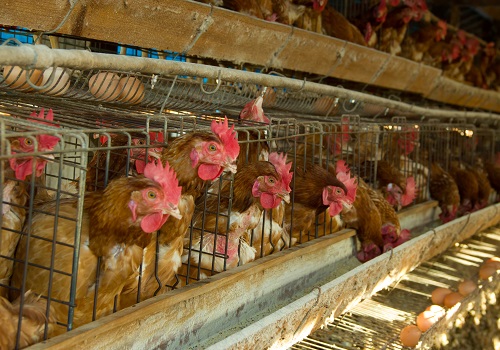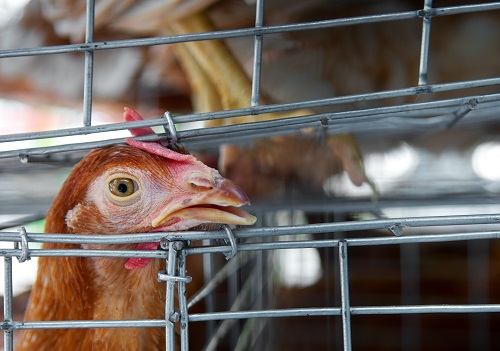Many Canadians, myself included, are surprised to learn that Canada has no federal animal welfare laws protecting animals in farms. Industry associations with multimillion-dollar marketing budgets make sure of it.
While we typically don’t see national ad campaigns promoting dentists, waste disposal, or other essential public services, we’re all familiar with decades of egg and dairy marketing. We’re fed the message that if something is produced in Canada, it is done so responsibly; that Canadian farms are small, family-run operations. Yet the average Canadian egg farm houses 23,000 hens, and the average chicken farm houses 36,000 chickens—and most of the country’s egg production falls under contracts with just a few major producers, such as industry giant Burnbrae Farms.
So who is responsible for establishing minimum welfare standards for these animals?
Canada’s most widely accepted animal welfare guidelines are developed by the National Farm Animal Care Council (NFACC), whose membership is dominated by top industry stakeholders. Unsurprisingly, NFACC standards are voluntary and in major part determined by producers themselves. They allow for cruel practices, such as “debeaking” baby chicks without anesthetic, separating newborn calves from their mothers, and confining laying hens in cages for their entire lives.
Whistleblowers have revealed cruel practices in factory farms across the country, but the response of lawmakers to a decade of allegations has been to pass a slew of anti-whistleblower laws. Global animal protection organization Mercy For Animals continues to share the injustices happening behind the scenes in Canadian farms with little to no action taken.
Polls continually show that Canadians care about animal welfare, with over 70% of recent survey respondents both opposing cage confinement of chickens and supporting a national ban of the increasingly dated practice. What’s more, animal welfare is now an established category of business risk that investors evaluate through annual corporate environmental, social, and governance (ESG) reports. In recent years, the global standards most widely used by food companies have incorporated species-specific disclosure requirements, such as reporting the percentage of cage-free egg and crate-free pork sales.
However, while animal welfare has become a global ESG topic, Canada’s animal agriculture sector masquerades as being accountable and having higher welfare standards—undermining animal welfare as a corporate responsibility issue for food companies, even those making good-faith efforts to improve.
Over 130 companies in Canada are committed to banning cages from their egg supplies by 2025. Meanwhile, entire countries and states around the world are passing cage-free legislation. Even the United States has far surpassed Canada in phasing out cages. Yet with deadlines for fulfilling cage-free policies fast approaching, companies are encountering a resistant industry that continues to invest in bigger cages, marketing them as “enriched colony housing,” instead of getting rid of cages altogether.
Enter Canada’s largest egg producer, Burnbrae Farms. Even though most major companies are set to implement public commitments made to consumers and investors, Burnbrae is not disclosing the percentage of hens in its operations who still suffer in cages or speaking to the company’s plans to help meet corporate demand for cage-free eggs.
The provincial and national industry associations that oversee Canada’s egg farms are not intervening; instead they serve as industry marketing boards. These groups use millions of taxpayer dollars from government grants to run “public trust” campaigns in lieu of making substantive changes to benefit the well-being of animals and create a sustainable food system that serves us all. In Quebec and Ontario alone, provincial egg boards spend $15–$25 million each on marketing every year.
At a time of historically high food prices, grocery chains reporting record profits, and food company executives ranking in the top 100 paid CEOs in Canada, Canadians are becoming weary of corporate sustainability claims. Companies are expected not only to follow through on their public promises but to demonstrate transparency along the way through annual public progress reporting and roadmapping.
With most major food companies committed to getting rid of cages and with growing public concern about transparency and humanewashing, leading producers, such as Burnbrae, can expect increasing scrutiny in the absence of commitments to ending investment in cages and improving transparency.
PJ Nyman is the Corporate Engagement Manager at Mercy For Animals Canada




Burnbrae is not disclosing the percentage of hens in its operations who still suffer in cages or speaking to the company’s plans to help meet corporate demand for cage-free eggs. You continue to invest in bigger cages, marketing them as “enriched colony housing,” instead of getting rid of cages altogether.
With most major food companies committed to getting rid of cages and with growing public concern about transparency and humanewashing, leading producers, such as Burnbrae, can expect increasing scrutiny in the absence of commitments to ending investment in cages and improving transparency.
My name is Mr Thomas PHOOKO a South African citizen based in South Africa
I am Poultry Worker and I have five years experience including egg picking and packaging. I have have also obtained Certificate in hatchery and Poultry Production. In my training I was trained and worked on Egg picking and packaging. Please,send me Recruitment agency in Canada that can assist me to secure employment in egg picking and packaging